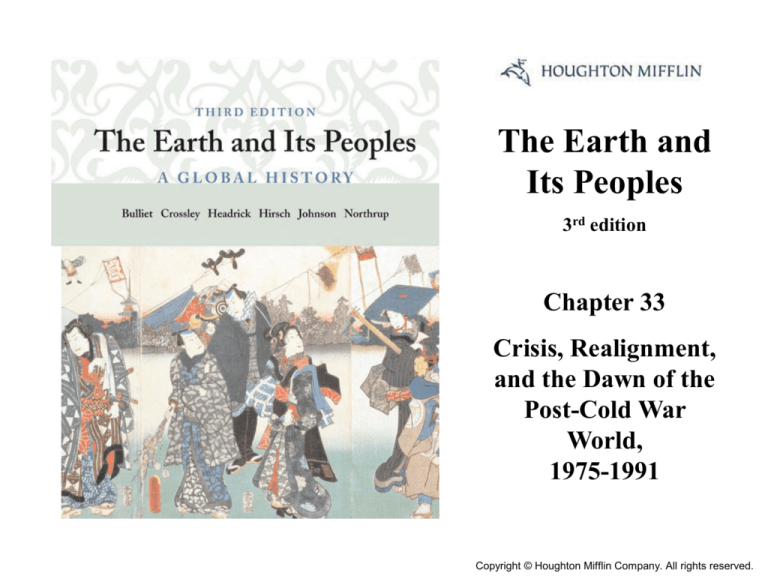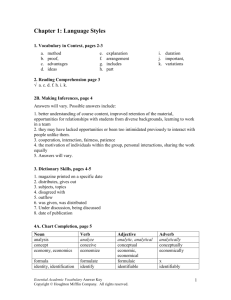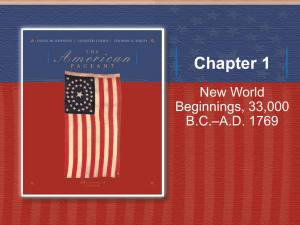
Cover Slide
The Earth and
Its Peoples
3rd edition
Chapter 33
Crisis, Realignment,
and the Dawn of the
Post-Cold War
World,
1975-1991
Copyright © Houghton Mifflin Company. All rights reserved.
Achebe, Anthills of the Savannah
Achebe, Anthills of the Savannah
The powerful novels of the Nigerian
writer Chinua Achebe focus on complex
and believable individuals caught up in
the unfolding drama of colonialism,
independence, and nation building in
Africa. As this book jacket photo
suggests, Achebe is an intensely serious
writer, a man who speaks for his people
and believes in the high moral calling of
literature and art. (Reproduced with
permission of publisher, Anchor
Books/Doubleday)
Copyright © Houghton Mifflin Company. All rights reserved.
Celebrating victory
Celebrating victory
A Russian soldier flashes the victory sign in front of the Russian parliament on August, 1991, as the last-gasp
coup attempt of Communist hard-liners is defeated by Boris Yeltsin and an enthusiastic public. The soldier
has cut the hammer and sickle out of the Soviet flag, consigning those famous symbols of proletarian
revolution to what Trotsky once called the "garbage can of history." (Filip Horvat/Corbis Saba)
Copyright © Houghton Mifflin Company. All rights reserved.
Chicago, The Dinner Party
Chicago, The Dinner Party
The multimedia creation of Judy Chicago (American installation artist, b. 1939)--features
thirty-nine handcrafted placemats and ceramic plates, each embellished with a painted motif
associated with the woman being honored. Begun in 1974 and completed in 1978, with the
participation of more than one hundred women, Chicago wanted to represent the “historic
struggle of women to participate in all the aspects of society.” It attracted enormous crowds.
((c) Judy Chicago. Photo: Donald Woodman.)
Copyright © Houghton Mifflin Company. All rights reserved.
Destruction of the rainforest
Destruction of the rainforest
The destruction of large portions of Brazil's virgin rain forest has come to symbolize
the growing threat to the environment caused by population growth and economic
development. In this photograph from the 1980s we see a tragic moonscape of tree
stumps and fragile topsoil ripped open by settlers. The name given to this place is
"Bom Futuro" (Good Future). (Jacques Jangoux/Peter Arnold, Inc.)
Copyright © Houghton Mifflin Company. All rights reserved.
Fall of Berlin Wall
Fall of Berlin Wall
Erected in 1961 to stop emigration from
communist East Germany to the West ,
the Berlin Wall had become an all-tootangible symbol of the division of
Europe, and much of the world, for more
than four decades after World War II. In
1989, when the communist regime in
East Germany collapsed, the East
German government opened the wall on
November 9th. In this photo we see East
Germans (backs to camera) streaming
through the dismantled Berlin Wall into
West Berlin. (Wide World Photos)
Copyright © Houghton Mifflin Company. All rights reserved.
Five generations of Chinese family
Five generations of Chinese family
This group portrait of five generations of
the Yang family suggests the enduring
Chinese commitment to close family
ties. It also puts a human face on social
transformation, for the great-greatgrandmother has bound feet and the
baby she holds will be an only child. In
the 1980s the Chinese government
prohibited couples from having more
than one child, a major factor in China's
falling birthrate. (Dermot Tatlow/Panos
Pictures)
Copyright © Houghton Mifflin Company. All rights reserved.
Indira Gandhi's funeral
Indira Gandhi's funeral
Jawaharlal Nehru's daughter, Indira Gandhi (1917–1984) became prime minister of India in 1966. She dominated Indian life for
a generation with a combination of charm, tact, and toughness. In a heavy-handed approach to resolving the problem of
population growth, her government had 7 million men sterilized in 1976. Many felt that her emergency measures marked the
end of parliamentary democracy. Her defeat in the next election and then a subsequent re-election undoubtedly strengthened
India's democratic tradition. But Mrs. Gandhi cracked down hard on Sikh radicals seeking independence and was assassinated
by Sikhs in retaliation. In this photo the body of Indira Gandhi is cremated in a solemn public ceremony according to Hindu
religion and custom. (David Turnley/Corbis)
Copyright © Houghton Mifflin Company. All rights reserved.
Italian feminists
Italian feminists
These Italian feminists demonstrate in
Rome in 1981 for the passage of
legislation legalizing abortion, which the
pope and the Catholic church have
steadfastly opposed. This woman's
provocative sign says that she does not
want the pope in her bed.
(Giansanti/Corbis Sygma)
Copyright © Houghton Mifflin Company. All rights reserved.
Jomo Kenyatta
Jomo Kenyatta
In April 1964, Prime Minister Jomo
Kenyatta (right) of Kenya waves his
plumed symbol vigorously to a crowd
before entering the East African Heads
of Government Conference held in
Nairobi. Sharing the delight of the
cheering reception are Dr. Nyerere
(left) of Tanganyika and Dr. Obote
(center) of Uganda. (Bettmann/Corbis)
Copyright © Houghton Mifflin Company. All rights reserved.
Juan O'Gorman, Credit Transforms Mexico
Juan O'Gorman, Credit Transforms Mexico
Emerging as an important architect in the 1930s, Juan O'Gorman championed practical
buildings and then led the movement to integrate architecture with art in postrevolutionary
Mexico. These panels from a 1965 fresco for a bank interior, entitled Credit Transforms
Mexico, combine an optimistic view of economic development with many Mexican motifs.
O'Gorman believed that Mexico had to preserve its cultural values in order to preserve its
independence. (Enrique Franco-Torrijos)
Copyright © Houghton Mifflin Company. All rights reserved.
Juan O'Gorman, Credit Transforms Mexico
Juan O'Gorman, Credit Transforms Mexico
Emerging as an important architect in the 1930s, Juan O'Gorman championed practical
buildings and then led the movement to integrate architecture with art in postrevolutionary
Mexico. These panels from a 1965 fresco for a bank interior, entitled Credit Transforms
Mexico, combine an optimistic view of economic development with many Mexican motifs.
O'Gorman believed that Mexico had to preserve its cultural values in order to preserve its
independence. (Enrique Franco-Torrijos)
Copyright © Houghton Mifflin Company. All rights reserved.
Kiefer, Osiris and Isis
Kiefer, Osiris and Isis
The German artist Anselm Kiefer (b. 1945) combines unusual materials to create haunting
images that often suggest the horrors of recent history. In this work, Osiris and Isis, painted
between 1985-1987, the interpenetrating layers of human culture include images of ruin and
death, hope and resurrection. (San Francisco Museum of Modern Art. Purchased through a gift
of Jean Stein by exchange, the Mrs. Paul L. Wattis Fund, and the Doris and Don Fisher Fund.
Photo: Ben Blackwell)
Copyright © Houghton Mifflin Company. All rights reserved.
Korea's Hyundai's dry docks
Korea's Hyundai's dry docks
This photo from the 1980s shows the busy dry docks owned by Korea's Hyundai Corporation,
which was founded on December 8, 1976. As the largest general trading company in Korea, in
1999 it was the first Korean company to exceed $20 billion in exports. Korea's rapid
industrialization symbolizes Pacific Rim economic growth. (Tony Stone/Getty Images)
Copyright © Houghton Mifflin Company. All rights reserved.
Lech Walesa
Lech Walesa
An inspiration for fellow workers at the Lenin Shipyards in the dramatic and successful strike against the
Communist bosses in August 1980, Lech Walesa (a feisty Lenin Shipyards electrician and devout Catholic)
played a key role in Solidarity before and after it was outlawed. Speaking here to old comrades at the Lenin
Shipyards after Solidarity was again legalized in 1988, Walesa personified an enduring opposition to
Communist rule in eastern Europe. (G. Merrillon/Gamma)
Copyright © Houghton Mifflin Company. All rights reserved.
"Le Hijab est Notre Honneur"
"Le Hijab est Notre Honneur"
During the fall of 1989, three teenaged
Muslim girls were suspended from a
public school near Paris because they
insisted on wearing the headscarves
traditional for Islamic women. In this
photo from October 1989, Muslim
women and girls demonstrate in Paris
and hold aloft a sign reading "The hijab
(headscarf) is our honor." (Wide World
Photos)
Copyright © Houghton Mifflin Company. All rights reserved.
Nicaraguan Revolution
Nicaraguan Revolution
The broad alliance of revolutionaries and reformers calling themselves Sandinistas
overthrew the corrupt dictatorship of Anastasio Somoza in Nicaragua in 1970. The
Somoza family had ruled Nicaragua since the 1930s and maintained a close
relationship with the United States. (Susan Meiselas/Magnum Photos)
Copyright © Houghton Mifflin Company. All rights reserved.
Nkrumah opening parliament
Nkrumah opening parliament
Under the leadership of Kwame Nkrumah (1909-1972), the Gold Coast--which he rechristened "Ghana"-became the first independent African state to emerge from colonialism. As part of an ancient ritual, two
medicine men pour out sacred oil and call on the gods to bless the work of the Second Parliament and
President Nkrumah, standing on the right. The combination of time-honored customs and modern political
institutions was characteristic of African states after they secured independence. (Wide World Photos)
Copyright © Houghton Mifflin Company. All rights reserved.
Rock Concert for African Famine Relief
Rock Concert for African Famine
Relief
The Live-Aid concerts, like this one in
London's Wembley Stadium, were
organized in the 1980s by the Irish
musician-turned-activist Bob Geldof.
Modern electronics and satellite
technology amplified its impact and
carried it throughout the world. Popular
music has been used for centuries to
mobilize public concern and engage the
feelings of young people. (Redferns
Music Picture Library)
Copyright © Houghton Mifflin Company. All rights reserved.
Students demonstrating, Tiananmen Square
Students demonstrating, Tiananmen
Square
In the late 1980s the Chinese government
banned all demonstrations and slowed the
trend toward a freer economy. In April 1989
China's idealistic university students
spearheaded demonstrations against these
policies and the increasing corruptness in
Chinese society. More than a million people
streamed into Beijing's central Tiananmen
Square on May 17 in support of the students'
demands. These exuberant demonstrators
personify the idealism and optimism of
China's prodemocracy movement. After some
hesitation the Communist government
crushed the student leaders and their
supporters with tanks and executions,
reaffirming its harsh, authoritarian character.
(Erika Lansner/stockphoto.com)
Copyright © Houghton Mifflin Company. All rights reserved.
UN in Cambodia
UN in Cambodia
These soldiers are part of a French battalion serving in a United Nations peacekeeping
operation in Cambodia (Kampuchea), a country that had been wracked by war and civil conflict
since 1970. United Nations forces usually provide humanitarian aid as they try to preserve
fragile cease-fires after warring armies agree to stop fighting. (J.F. Roussier/Sipa Press)
Copyright © Houghton Mifflin Company. All rights reserved.
Vaclav Havel
Vaclav Havel
Denied admission to the university because of his upper-middle-class origins, Vaclav Havel gravitated to the
theater. In 1968 when the Soviets rolled into Czechoslovakia, Havel threw himself into the intellectual
opposition to communism and became its leading figure for the next twenty years. Havel was a voice of hope
and humanity during these years, one that inspired his compatriots with a lofty vision of a moral
postcommunist society. As president of the Czech Republic (1989-2003), Havel continued to speak
eloquently on the great questions of our time. (Chris Niedenthal/stockphoto.com)
Copyright © Houghton Mifflin Company. All rights reserved.
Women's work in Soviet Union
Women's work in Soviet Union
This cartoon adapts the caryatid form
from ancient sculpture to depict the
special burdens that were coming to bear
more heavily on women as the Soviet
economy bogged down. Intended to
commemorate International Women's
Day, the image appeared in the Soviet
magazine Krokodil in 1984. (Krokodil
Magazine, March 1984)
Copyright © Houghton Mifflin Company. All rights reserved.
Youth revolution, London, ca. 1980
Youth revolution, London, ca. 1980
A wonderful photograph of colorfully-and outrageously--dressed youth in
London (ca. 1980), during what is called
the "youth revolution." (Anthea
Sieveking/The Wellcome Trust Medical
Photographic Library)
Copyright © Houghton Mifflin Company. All rights reserved.
Map: The End of Soviet Domination in Eastern Europe
The End of Soviet Domination in Eastern Europe
The creation of new countries out of Yugoslavia and Czechoslovakia and the reunification of Germany marked the most
complicated changes of national borders since World War I. The Czech Republic and Slovakia separated peacefully, but
Slovenia, Croatia, Macedonia, and Bosnia and Herzegovina achieved independence only after bitter fighting. (Copyright (c)
Houghton Mifflin Company. All Rights Reserved.)
Copyright © Houghton Mifflin Company. All rights reserved.
Map: The End of the Soviet Union
The End of the Soviet Union
When Communist hardliners failed to overthrow Gorbachev in 1991, popular anti-Communist sentiment swept the Soviet
Union. Following Boris Yeltsin's lead in Russia, the republics that constituted the Soviet Union declared their independence.
(Copyright (c) Houghton Mifflin Company. All Rights Reserved.)
Copyright © Houghton Mifflin Company. All rights reserved.
Map: Russia and the Successor States
Russia and the Successor States
After the attempt in August 1991 to depose Gorbachev failed, an anticommunist revolution swept the Soviet Union. Led by Russia and Boris Yeltsin,
the republics that formed the Soviet Union declared their sovereignty and independence. Eleven of the fifteen republics then formed a loose
confederation called the Commonwealth of Independent States, but the integrated economy of the Soviet Union dissolved into separate national
economies, each with its own goals and policies. (Copyright (c) Houghton Mifflin Company. All Rights Reserved.)
Copyright © Houghton Mifflin Company. All rights reserved.
Map: World Population Growth
World Population Growth
At current rates of growth, every three years, the world's population will increase by the equivalent of a nation the size of the
United States. Most of this population increase will be in some of the world's poorest nations. By 2050, for example,
Pakistan, a nation of only 40 million in 1950, will surpass the United States and become the country with the world's third
largest population. (Copyright (c) Houghton Mifflin Company. All Rights Reserved.)
Copyright © Houghton Mifflin Company. All rights reserved.


